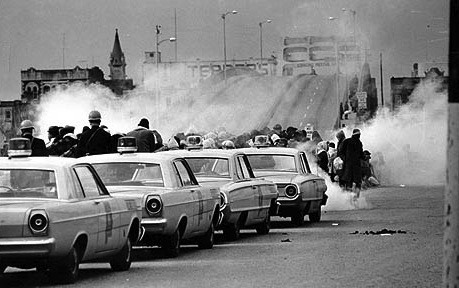Eric and I have been filming in Selma, Alabama documenting the Bridge Crossing Jubilee held every year to commemorate the 1965 march for voting rights across Edmund Pettus Bridge and the violent treatment of the marchers by the police, referred to as Bloody Sunday.

This year is especially meaningful because the Voting Rights Act of 1965 is being challenged before the US Supreme Court. In Shelby County v. Holder, an Alabama county just north of Selma is challenging a key provision of the Voting Rights Act, Section 5, which requires 9 southern states and other districts with a history of voter suppression to get a pre-clearance from the Department of Justice for any changes in the voting laws.
Many civil rights lawyers and leaders believe that if Section 5 is struck down that it would leave many voters vulnerable to discriminatory laws.
It is interesting that the justices of the Supreme Court are making empirical claims about our nation such as the: South has changed; the South is not more racist than the rest of the country.
I think it’s imperative to figure out how to answer such questions. Has the South changed? Is it less racist? Has there been progress? If so, what kind of progress?
These are big and broad questions that are difficult to answer, but our policies and laws are determined by how a few people choose to frame them, including Justices on the Supreme Court. This is troubling. Eric and I are trying to explore these questions in our own way here by talking to people who are involved in the civil rights movement as well as their critics and others in the wider Selma community.
We have made contact with, but have not yet interviewed leaders of “Friends of Forrest,” who have successfully petitioned the Selma city government to allow a monument honoring the founder of the Ku Klux Klan to be erected on public land. We will also attempt to engage officials in Shelby County, AL who have brought the latest in a decades-long string of legal challenges to the 1965 Voting Rights Act.
Eric put together a rough edit of video we shot with attorneys at the NAACP who are defending the Voting Rights Act before the Supreme Court. A more polished version, that includes more voices will replace this video soon:
Listen to an archived Coffee Party Radio show in which we discuss the Supreme Court case that could strike down a key provision of the 1965 Voting Rights Act, and what it could mean for America.
Please support Story of America with a tax deductible donation.
